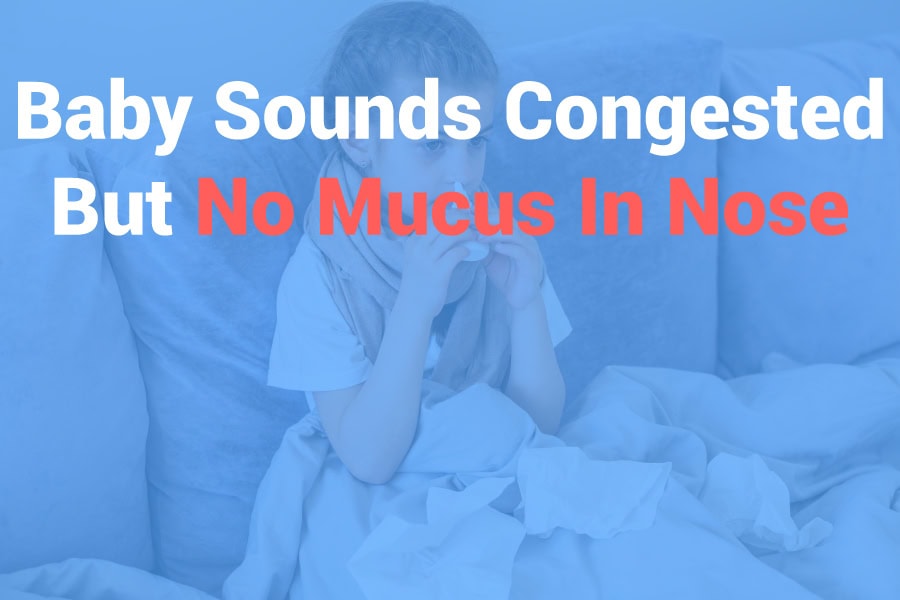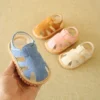One of the most alarming situations for new parents is when their baby sounds congested, but there’s no visible mucus in the nose. It can cause confusion and concern about whether the baby is breathing properly or if there is an underlying issue. Congestion without mucus in infants is more common than you might think, and often, it doesn’t indicate a serious problem. However, understanding the possible causes and solutions is crucial in helping your baby breathe comfortably. This article will explore why your baby might sound congested even when there’s no mucus in their nose, how to recognize the signs, and what steps you can take to relieve the congestion. We’ll also address common questions, providing parents with the knowledge to keep their little ones healthy and comfortable.
Baby sounds congested but no mucus in nose?
A baby can sound congested even when there’s no visible mucus due to dry air, allergens, or a narrow nasal passage common in newborns. While it may sound alarming, it’s typically not a cause for concern unless accompanied by other symptoms like difficulty breathing or fever. Simple remedies like using a humidifier, ensuring the baby is hydrated, or gently cleaning the nasal passage can help relieve the congestion.
Why Does My Baby Sound Congested Without Visible Mucus?
Infants often experience congestion, and this can happen even without visible mucus in their nose. This type of congestion is particularly common in newborns because their nasal passages are small and sensitive. It may seem as if the baby is having difficulty breathing, which can be distressing for parents. However, there are several reasons why a baby might sound congested even without the presence of mucus.
One of the primary reasons for this is dry air. In many cases, the air in your home might be too dry, especially during winter when heating systems are running. Dry air can irritate the nasal passages, causing them to swell slightly and make the baby sound congested, even though there’s no excess mucus.
Another common cause is environmental allergens or irritants. Dust, pet dander, or even strong fragrances in the home can lead to a baby sounding congested. Newborns are particularly sensitive to their environment as their immune systems are still developing, and their respiratory systems are adjusting to life outside the womb.
Additionally, some babies may sound congested due to reflux. When a baby spits up, a small amount of milk or formula may enter the back of the nasal cavity, causing irritation and congestion sounds, even though no mucus is present.
Congestion without mucus can also be caused by the baby’s position. When lying flat, the baby’s airway can become slightly obstructed, leading to congestion-like sounds. This is usually harmless but can be alleviated by gently changing the baby’s position.
How to Relieve Congestion in Babies When No Mucus is Present?
Check the Humidity Levels in Your Home
Low humidity can dry out your baby’s nasal passages. Use a cool-mist humidifier to increase moisture in the air, which can soothe your baby’s airways.
Hydrate Your Baby
Keeping your baby hydrated can help thin any mucus that might be present but not visible. Offer frequent feedings, whether breast milk or formula, to keep them well-hydrated.
Use Saline Drops
Even without visible mucus, saline drops can help moisturize the nasal passages. A couple of drops in each nostril can help loosen any dryness and relieve the congested sound.
Elevate Your Baby’s Head
If your baby sounds congested while lying flat, try gently elevating their head. This can help open up the airway and reduce the congested sound. Be sure to do this safely by slightly raising the head of the mattress rather than using pillows directly under the baby’s head.
Clean the Environment
Ensure that the baby’s room is free from dust, pet dander, or any strong odors. This will reduce irritation in their nasal passages, helping to clear up the congestion.
Common Causes of Infant Congestion
There are several potential causes for your baby to sound congested without mucus. Below are the most common causes:
- Dry air: Heating systems in the winter can dry out nasal passages.
- Allergens: Environmental factors like dust and pet dander.
- Reflux: Acid reflux can irritate the nasal cavity.
- Small nasal passages: Newborns naturally have smaller, more sensitive airways.
- Positioning: Lying flat can cause the baby to sound congested.
How to Prevent Baby Congestion in the Future?
Preventing congestion without mucus in babies is possible by making small adjustments to their environment and care routine. One of the best ways to prevent congestion is to keep the air in your home at an optimal humidity level. You can achieve this by using a humidifier, especially during winter when the air tends to dry out due to heating systems. Ideally, the humidity level in your home should be between 40% and 60%. This moisture level can keep your baby’s nasal passages from drying out and becoming irritated.
Another important factor is the cleanliness of your home environment. Regularly cleaning your baby’s room and ensuring that their sleeping area is free from dust and pet dander will help prevent any irritants from affecting their nasal passages. Avoid using strong fragrances or cleaning products around your baby as these can also contribute to irritation.
Keeping your baby well-hydrated is another key preventative measure. Whether through breastfeeding or formula feeding, making sure your baby gets enough fluids can help thin out any mucus that might be present but not visible, making it easier for them to breathe.
Lastly, be mindful of how you position your baby when they sleep or rest. Keeping them slightly elevated can prevent their airways from becoming obstructed, which may reduce the chances of them sounding congested. You can achieve this by elevating the head of their crib or using a specially designed baby wedge pillow.
When Should You Worry About Baby Congestion Without Mucus?
There are times when baby congestion, even without visible mucus, may signal a more serious problem. It’s essential to recognize the difference between normal, harmless congestion and symptoms that warrant medical attention.
How Long Has the Congestion Lasted?
If the congestion persists for more than a week or gets worse over time, it may be worth consulting your pediatrician. Prolonged congestion could be a sign of an underlying issue like a respiratory infection.
Is Your Baby Having Difficulty Breathing?
Listen carefully to your baby’s breathing patterns. If they are having difficulty breathing, are wheezing, or their chest seems to be retracting with each breath, this could be a sign of a more serious respiratory issue.
Does Your Baby Have a Fever?
Congestion without mucus, paired with a fever, may indicate a viral or bacterial infection. In such cases, you should consult your doctor immediately to determine the cause and appropriate treatment.
Bottom Line
When your baby sounds congested but has no mucus in the nose, it’s usually due to environmental factors, positioning, or natural sensitivity. You can typically alleviate your baby’s symptoms by making adjustments to the air quality, keeping your baby hydrated, and ensuring a clean environment. However, always monitor for more serious signs, such as fever or difficulty breathing. If the symptoms persist or worsen, seek medical advice. Understanding your baby’s needs and the reasons for their congestion will help keep them comfortable and healthy.
FAQ’s
Q. Why does my baby sound congested without mucus in their nose?
A. Babies can sound congested due to dry air, allergens, or their natural anatomy, even if no mucus is visible.
Q. How can I help my baby when they sound congested?
A. Use a humidifier, keep them hydrated, and ensure their sleeping environment is clean and slightly elevated.
Q. Should I worry if my baby sounds congested but has no fever?
A. Typically, congestion without a fever is not serious, but consult your pediatrician if it persists or worsens.
Can dry air make my baby sound congested?
A. Yes, dry air can irritate your baby’s nasal passages, causing them to sound congested even without mucus.








